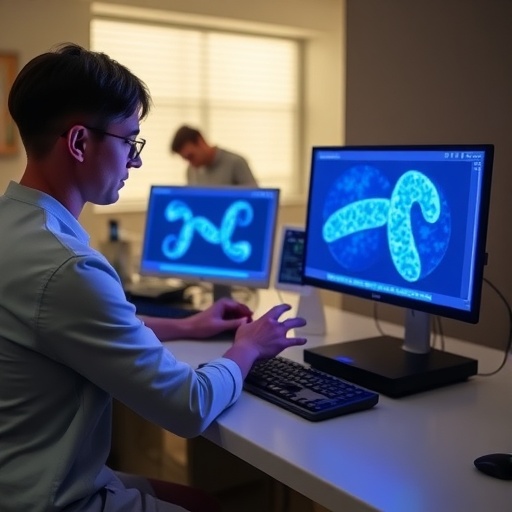In a groundbreaking initiative destined to reshape the landscape of early cancer detection, a multi-institutional collaboration spearheaded by Carnegie Mellon University has secured a substantial $26.7 million award from the Advanced Research Projects Agency for Health (ARPA-H). This ambitious endeavor aims to develop a next-generation, at-home cancer screening technology capable of detecting more than 30 types of stage 1 solid tumors through a simple urine test, marking a pivotal advancement in proactive oncology diagnostics.
Leading the research and development efforts is Rebecca Taylor, a prominent mechanical engineering professor at Carnegie Mellon University, supported by co-investigator Burak Ozdoganlar. Their expertise in mechanical engineering converges with the cutting-edge fields of synthetic biology and nucleic acid nanotechnology to forge a novel cancer detection platform. The project integrates an innovative orally administered pill embedded with engineered tumor-targeting sensors alongside a highly sensitive urine analysis device intended for use in the convenience of patients’ homes.
Unlike traditional cancer detection methods that frequently require invasive biopsies, complex imaging, or hospital visits, this technology leverages biological and chemical signatures of tumors. The pill contains biosensors calibrated to detect microenvironmental cues characteristic of malignant cells, namely hypoxia (low oxygen levels), increased acidity, and elevated lactate concentrations, which are well-established hallmarks of tumor physiology. These sensors respond dynamically to such conditions by releasing synthetic molecular reporters that are specifically tailored to signify the presence of cancer and identify the tumor’s tissue of origin.
Following ingestion, the biosensors transit the body’s vascular system and tissue compartments to home in on suspicious microenvironments, reacting only where pathological conditions prevail. Once activated, the sensors emit synthetic reporter molecules that enter the body’s excretory pathway and accumulate in urine. This non-invasive excretion route enables an accessible biological sample to be collected effortlessly by patients, circumventing the need for clinical blood draws or imaging modalities.
The accompanying screening device, crafted as a compact diagnostic tool, employs CRISPR-Cas-based biosensors to detect the RNA reporters within the urine sample. This device translates reporter presence into measurable electrical signals, utilizing nucleic acid recognition and amplification techniques to ensure high sensitivity and specificity. The multiplexed platform is designed to delineate not only the existence of cancerous lesions but also their anatomical origins, empowering personalized surveillance and early intervention strategies.
Beyond detection, this system connects wirelessly to smartphones, delivering real-time results paired with comprehensive educational content and tailored pathways for medical follow-up. This integration exemplifies patient-centric innovation by combining molecular diagnostics with digital health technologies to enhance accessibility, engagement, and adherence.
The significance of this technology lies not only in its scientific novelty but also in its potential scalability and affordability. The goal is to commercialize this multi-cancer detection kit at a retail price below $100, rendering early cancer screening accessible to a vast population. Affordable widespread screening presents an unprecedented opportunity to reduce cancer-related mortality by enabling interventions at the earliest stages when treatments are most effective and least invasive.
This project’s commercial translation is facilitated by Ginkgo Bioworks, the selected commercialization partner, which brings expertise in synthetic biology and bioengineering to the table. Their involvement ensures the seamless scaling of complex biologics and molecular devices from the lab bench to consumer-ready medical products.
The collaboration extends beyond Carnegie Mellon, drawing on the diverse knowledge and experience of partners at the University of Pittsburgh, the University of Massachusetts Amherst, KU Leuven, and industry leaders such as Velentium Medical, Clinical Research Strategies, and Platypus Bio. This convergence of academia and industry underscores the multi-disciplinary nature required to tackle the complexities of cancer diagnostics.
The technological approach is visionary, combining recent advances in synthetic biology—which enables the design of living systems to perform novel functions—and nucleic acid nanotechnology, which manipulates RNA and DNA molecules for highly sensitive detection. Importantly, the use of CRISPR-Cas systems in this context exemplifies the cutting edge of molecular diagnostics, leveraging programmable nucleases to detect very specific sequences of synthetic RNA reporters efficiently.
As Rebecca Taylor emphasizes, this dual-function approach promises an unprecedented degree of precision, turning the human body into a living sensor array that can reveal hidden tumors before they manifest clinically. The vision is to make early cancer detection as simple as administering a pill and collecting a urine sample at home, disrupting current paradigms of reactive, symptom-driven diagnostics.
Burak Ozdoganlar adds that this innovation is not only a scientific leap but a humanitarian imperative, aiming to democratize cancer screening globally. Making reliable, easy-to-use diagnostics widely available empowers individuals to monitor their health proactively, reducing the incidence of advanced-stage cancer diagnoses that are costly and devastating.
Moving forward, the team intends to advance this technology through rigorous human clinical trials to validate safety, efficacy, and user experience. Success in clinical validation will pave the way for regulatory approvals and mass production, culminating in a product poised to save millions of lives worldwide by shifting the detection window upward—ensuring intervention when cancers are most treatable.
In conclusion, this pioneering project represents a powerful fusion of engineering, synthetic biology, and digital health applied to one of humanity’s most pressing medical challenges. By harnessing bioengineered sensors, nucleic acid nanotechnology, and CRISPR-based diagnostics, the team is charting a new course toward affordable, patient-friendly, and life-saving cancer screening that could revolutionize how healthcare is delivered and experienced.
Subject of Research: Early cancer detection technology leveraging synthetic biology and nucleic acid nanotechnology for non-invasive, at-home cancer screening via urine analysis.
Article Title: Transforming Early Cancer Detection with Synthetic Biology: Carnegie Mellon-Led Team Develops At-Home Urine Test for 30+ Stage 1 Cancers
News Publication Date: Not specified
Web References:
– ARPA-H POSEIDON program: https://arpa-h.gov/explore-funding/programs/poseidon
– Carnegie Mellon University: http://cmu.edu/
– CMU College of Engineering: http://engineering.cmu.edu/
Keywords: Cancer screening, Oncology, Urine diagnostics, Synthetic biology, Nanotechnology, CRISPR-Cas technology, Early cancer detection, Multi-cancer detection kit, At-home medical device




